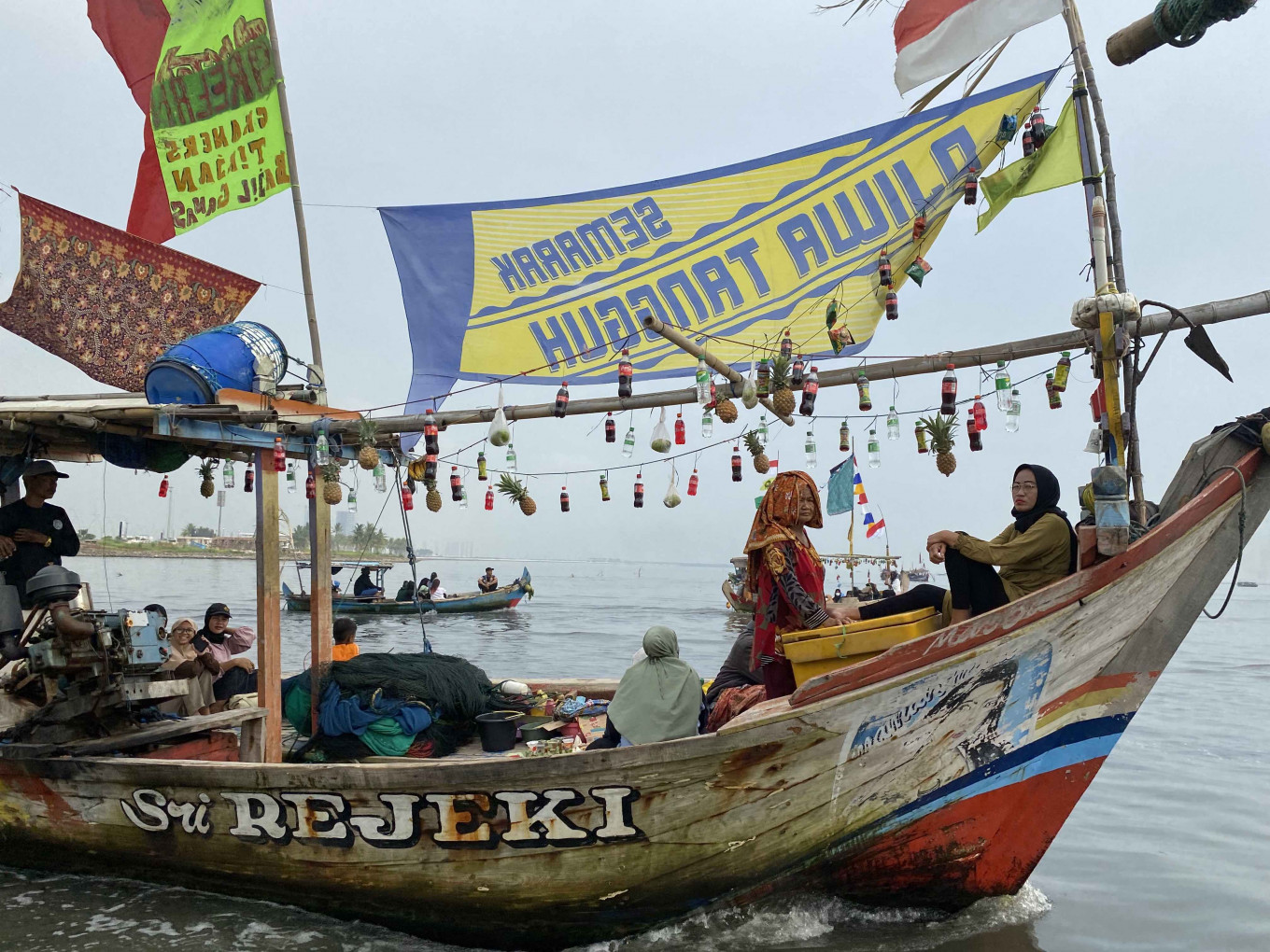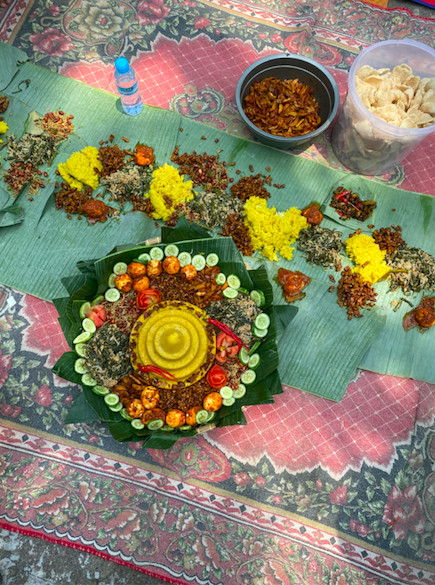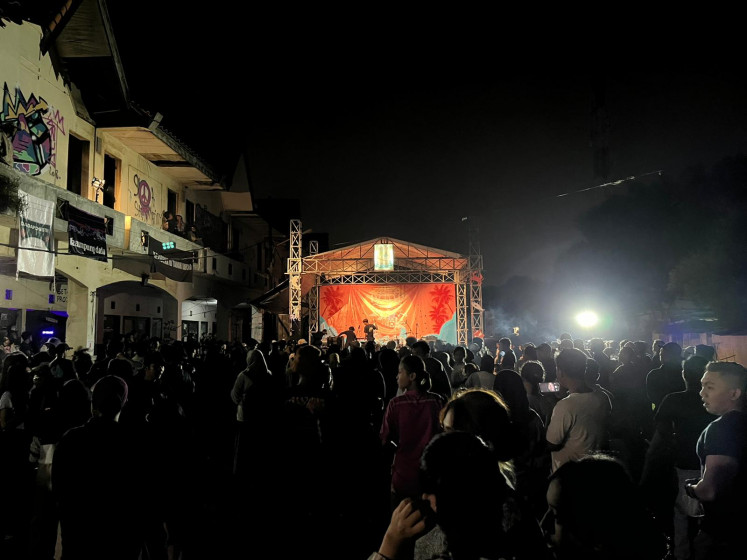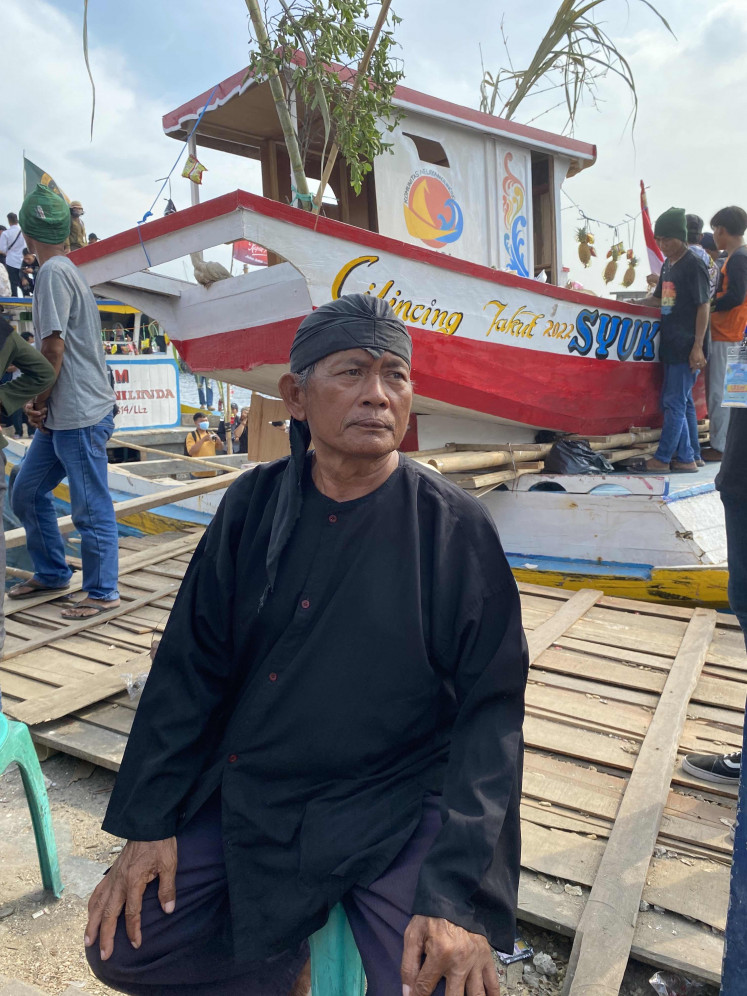Popular Reads
Top Results
Can't find what you're looking for?
View all search resultsPopular Reads
Top Results
Can't find what you're looking for?
View all search resultsCelebrating the sea in a sinking city
Along Jakarta’s ever-transforming coastline, fishing communities welcome the months of September through December to give thanks to the oceans and to hold on to their traditions, with young people taking the helm.
Change text size
Gift Premium Articles
to Anyone
A
long Jakarta’s ever-transforming coastline, fishing communities welcome the months of September through December by giving thanks to the oceans, with young people taking the helm in holding on to tradition.
Suppose you happened to be anywhere along the North Jakarta coastline over the past few weeks. In that case, you might have noticed small armadas of colorful fishing boats decorated with batik, flags and dangling snacks pass by, throwing sugar canes into the sea and placing plates of traditional food and buffalo heads onto bamboo platforms and boats before coming together in a chaotic circle and capsizing them into the sea.
If you did, you caught the Nadran, or pesta laut (sea festival), the annual ritual practiced by fishermen and their families to give thanks to the sea for their livelihoods and the future. The ceremony, which has been going on for generations along Java’s northern coastline between September and December, has adapted to life in one of the world’s largest coastal cities.
And despite the challenges facing fishermen along Jakarta’s coast, with the city’s well-documented sinking and the world’s rising sea levels – with current predictions from the National Research and Innovation Agency (BRIN) suggesting 25 percent of Jakarta, particularly around North Jakarta, will be submerged by 2050 – alongside increasing coastal development projects and pollution affecting fish stocks, these festivals continue to get bigger, with the villages’ younger generations making them their own.
Bringing Nadran into the next generation, these ritual celebrations are turning into full-blown festivals, with music and activities for villagers and guests from outside. Two such festivals occurred in recent weeks: Festival Dadap in Kampung Dadap Baru, Banten, and Festival Nelayan Cilincing in Cilincing, North Jakarta.
Raising Dadap
Located on Banten’s coast, surrounded by the growing Pantai Indah Kapuk (PIK) complex, Kampung Baru Dadap is an unlikely place to picture a traditional fishing festival. It is better known for the village’s hardships, run-ins with security forces related to the village’s red-light district that emerged a few years ago, or making the news for flooding that blights the community year in and year out rather than the culture within.
But for the local people of Dadap, the final few months of the year offer an opportunity to celebrate what it means to be a fishing community and their history of being part of Dadap.
“What makes Dadap special,” Lisnawati, 48, a large mother-like figure in Dadap who organizes the annual nasi tumpeng (symbolic conical rice dish) as part of the ritual said, “is that the community is enthusiastic, it is cohesive, and it is very respectful. In Dadap, not all of us here are Betawi. There is a mix from Bugis, Java, Indramayu and Lampung […] People settle here from elsewhere. This is the third generation living in Dadap. The kids making the festival are the fourth, but they are never far from their [original] culture. That is why we do the pesta laut.”
Kampung Dadap Baru’s Nadran celebrations took place on Oct. 15-16, with around 100 boats going out to sea. It was accompanied by Festival Dadap, organized by a group of 20 young people from Dadap.
The festival included two stages, one with live music, poetry, theater and dance performances and mural artworks from artists all over Java, as well as photography exhibitions and film screenings, a second hosting a wayang troupe from Indramayu, further down the coast in West Java. There was also a night fair, and guests traveling to Dadap to watch the sea celebration were offered the chance to go on a traditional fishing boat for Rp 35,000 (US$2.25).
This was the second time the festival had been run after a year’s hiatus due to the pandemic, and the subsequent buzz of the weekend was electric.
The evening before the journey to the sea, children ran around the village festival site stopping to look at large photographs taken around Dadap placed at the side of the stage, a crowd jumped and crowd-surfed to Jakartan pop-punk and whooped at heartfelt poetry performances. About a five-minute walk away, along fairy light-strung, mud-slick streets, the village elders sat down to watch the wayang performance. Beside them, the boat prepared with the sesajen (offerings), laden with flowers, fruit and rice for the next day.
Nur Aulia Putri, 23, one of 20 young people from Dadap involved in the festival led by Deddy Sopian explained, “Dadap was known as a place of prostitution, of damaged roads [from flooding], and lots of stereotypes. But the place I know is one that is rich, with solid human resources. The people here are friendly and creative. So I see this festival as a chance to preserve our identity and show others the best side of Dadap.”
Young people are key
Thirty-six kilometers along the coast to the east and one week later in the village of Kampung Nelayan Cilincing, a similar event and festival took place with between 200 and 300 boats participating. Organized by Komunitas Nelayan Cilincing (Kunci) and headed by Edi Kurniawan, as, in Dadap, the fisherman festival of rituals, gamelan and offerings was joined by a music festival with competitions and a bazaar hosting local businesses, run by the village’s youth.
Located next to Indonesia’s busiest seaport Tanjung Priok, the village of Cilincing has slowly moved away from catching fish as its primary source of income. Aman, one of the fishermen taking part in the pesta laut, explained that with the depleting fish in the waters nearby because of the local industry, many fishermen had turned to the more lucrative business of collecting scrap metal from the factories. Some work as ferry service providers for goods and people between the large ships coming to dock at the port.
But standing in front of rows of decorated boats on the morning of the Nadran, after a night of live music performances and with the sound of gamelan still going on from the night before in the background, the symbolism and meaning of the pesta laut remained crucial for the rows of residents who came out to take part or to watch from the bay.
Village figure: Sarkim (67) the 'juru kunci' (spiritual guide) of Kampung Nelayan Cilincing's 'pesta laut' in North Jakarta guards the boat of offerings and whispers prayers before the ritual begins on Oct. 22. (JP/Harriet Crisp) (JP/Harriet Crisp)Sarkim, 67, the juru kunci (spiritual guide) of the festival, sat in front of the boat of offerings, dressed in black and whispering prayers. He stopped for a second to explain to The Jakarta Post how he had traveled to nine points along the coast of North Jakarta before the event, gathering water from the sea at each point to bring to Cilincing, representing the unity of the waters around North Jakarta.
Speaking to the Post, Edi explained that getting young people involved in the festival was “for the sake of the survival of the fishermen and their belief system and rituals.” Edi hoped that making the festival bigger by bringing in media and people from outside of Cilincing would create greater awareness of the fishermen and the traditional culture practiced today.
“If the dreadlock festival in Dieng can be such a success, what stops us from being so successful here?” he said, referring to the Dieng Cultural Festival in Central Java, where tourists from all over Indonesia and worldwide come to watch children getting their haircuts as part of the local traditions.
And in the rush of the main ritual, with the hundreds of boats thudding their way across the waves and men, women and young people coming together to organize and celebrate, these events are chaotic and joyous moments that deserve a place on the country’s cultural calendar. In a city as large as Jakarta, where it is easy to get lost in the crowd, these small, marginal fishing villages are holding onto the space for themselves.
Dadap and Cilincing hope the festivals will be on again next year, with more people coming to watch and more significant celebrations to go with them. But if readers find that they cannot wait until then, take a trip to the north coast before December, and you might, if you are lucky, catch a small storm of fishing boats making its way out on the water, whooping and celebrating and releasing their offerings of thanks into the sea.
Instagram:
@festival.dadap
@kunci_nelayan













